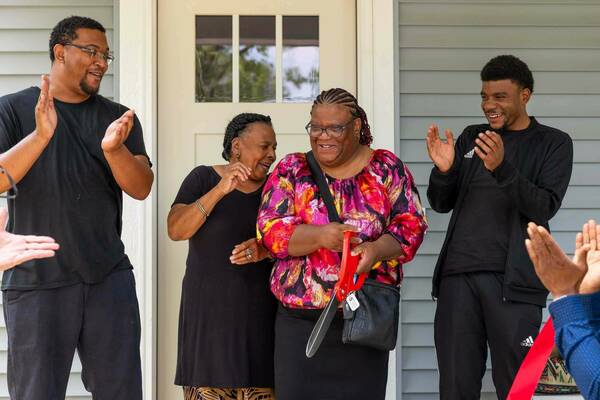To prevent opioid misuse in teens and young adults, researchers turn to AI and social media data
Teenagers spend more than five hours on social media each day. Their online interactions might reveal clues that save them from the opioid epidemic.

Graduating classes are dwindling as the opioid epidemic claims the lives of high school and college-aged adolescents from communities throughout the United States.
America’s increased activity on social media platforms has heightened the risks of opioid overdose and drug misuse, while research to promote personalized health, safety and intervention recommendations to the nearly 30 percent of at-risk teenagers and young adults (TYAs) has been lacking.
Now, researchers at the University of Notre Dame are developing a new artificial intelligence-driven paradigm using social media data to provide insights into personalized interventions for reducing opioid misuse and death among teens and young adults.
Recently, the U.S. National Science Foundation awarded a $1.5 million grant for a four-year project to use large-scale social media data generated from TYAs, roughly ages 15 to 25, to develop a messaging platform tailored to individual risks and community contexts aiming to promote community resilience against opioid misuse and addiction.
“Opioid overdose deaths have continued to increase across the country; specifically, TYAs are disproportionately affected by and particularly vulnerable to misuse and addiction. Parents of at-risk teens who have been impacted by the opioid epidemic frequently contact me to share their stories,” said Yanfang (Fanny) Ye, the Galassi Family Collegiate Professor in Computer Science and Engineering and associate director of applied analytics for the Lucy Family Institute for Data & Society.

Ye will lead the project, titled “A New AI-Driven Paradigm to Promote Community Resilience for Teenagers and Young Adults in Preventing Opioid Misuse and Addiction.” Input from 14 community partners, including the parents of at-risk youth, medical clinicians, emergency response services personnel, representatives from the National Institute on Drug Abuse and public school leadership will help direct the project’s design and development and link to community-based prevention and treatment services.
An expert in AI and machine learning, Ye has conducted multiple projects to combat the opioid epidemic through AI innovation. In 2023, her work was broadcast on NBC as part of the University’s award-winning “What Would You Fight For?” series, which showcases the work, scholarly achievements and global impact of Notre Dame faculty, students and alumni.
“By analyzing data collected from platforms where TYAs are actively engaged, we can develop a valuable network of relationships that identify the risks of opioid misuse, and offer customized prevention and intervention options directed at this distinct yet vulnerable age group,” Ye said.
Developing an application to detect at-risk TYAs is pivotal to the project’s success.
Ye is working with researchers from the Applied Analytics & Emerging Technology Lab within the Lucy Family Institute to apply a graph-based deep learning approach to identify TYAs who are most likely to be at risk of opioid misuse and addiction. Graph neural networks are artificial intelligence applications that are designed to build relationships between visualizations, models or graphed data. Recently, graph neural networks have been used for weather forecasting models and for the discovery of novel antibiotics and polymers.
Ye and the Applied Analytics & Emerging Technology Lab team will use the graph neural networks and large language models to identify key risk factors from at-risk groups to develop a safety-enhanced multimodal learning framework for tailored messaging. The applications will provide personalized, interactive and educational messages to TYAs based on their community characteristics and individual circumstances in preventing opioid misuse and addiction.
“The University of Notre Dame is guided by a moral imperative to address the challenges of society’s most vulnerable populations, including those facing the dangers of the opioid epidemic,” said Nitesh Chawla, founding director of the Lucy Family Institute and the Frank M. Freimann Professor of Computer Science and Engineering. Chawla is a co-principal investigator on the project. He adds, “Through data-driven AI innovation, the Lucy Family Institute is committed to providing impactful research that can promote resilience and well-being for future generations.”
Other co-principal investigators on the project include Erin Winstanley, professor of medicine at the University of Pittsburgh, and Chuxu Zhang, associate professor of computer science and engineering at the University of Connecticut.
The outcomes of the project will be made publicly available for wide distribution.
To learn more about Ye’s current research, visit http://yes-lab.org/.
Contact: Brandi Wampler, associate director of media relations, 574-631-2632, brandiwampler@nd.edu
Latest ND NewsWire
- Researchers deconstruct chikungunya outbreaks to improve prediction and vaccine developmentThe symptoms come on quickly — acute fever, followed by debilitating joint pain that can last for months. Though rarely fatal, the chikungunya virus, a mosquito-borne illness, can be particularly severe for high-risk individuals, including newborns and older adults. While the virus is common…
- Eck Institute investigator to strengthen postpartum care for Indiana mothersYenupini Joyce Adams, associate professor of the practice and maternal health lead for the Eck Institute for Global Health at the University of Notre Dame, is partnering with Beacon Health System to pilot a new, first-of-its-kind postpartum care model in the South Bend-Elkhart community.
- Gen. Martin Dempsey to speak at Notre Dame Forum event on ‘Hope, Global Stability and the Role of the United States’Gen. Martin Dempsey, the retired 18th chairman of the Joint Chiefs of Staff, will join University President Rev. Robert A. Dowd, C.S.C., for a fireside chat at 4 p.m. Friday (Oct. 10), as part of the 2025-26 Notre Dame Forum. The discussion, titled “Hope, Global Stability and the Role of the United States,” is part of the exploration of this year’s Notre Dame Forum theme, “Cultivating Hope.” It will take place in Rooms 215/216 of McKenna Hall and will also be livestreamed. The event is free and open to the public.
- University of Notre Dame joins the Global Coalition of Ukrainian StudiesThe University of Notre Dame has joined the Global Coalition of Ukrainian Studies after signing a memorandum of cooperation, formalized Sept. 24, at the Ukrainian Institute of America in New York City. Notre Dame joined four other American institutions that were also publicly welcomed to the coalition at this event: Arizona State University, Columbia University, Manor College and the Shevchenko Scientific Society.
- One year later, Inauguration Build a ‘dream come true’ for Habitat familiesOne year later, work on Inauguration Build 2024 is complete, offering shelter and so much more to five local families.
- Alumni Association and YoungND honor 2025 Domer DozenThe Notre Dame Alumni Association announced its 2025 Domer Dozen cohort, honoring 12 graduates ages 32 and younger for excellence in their contributions in learning, service, faith and work — the core pillars of the association’s mission.













